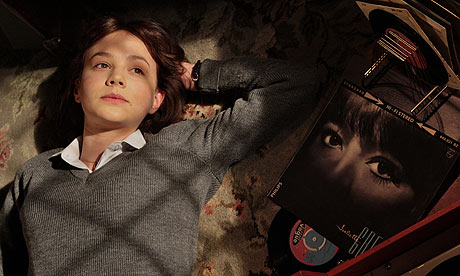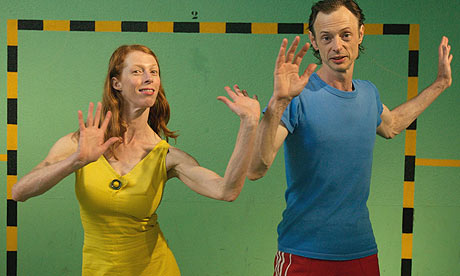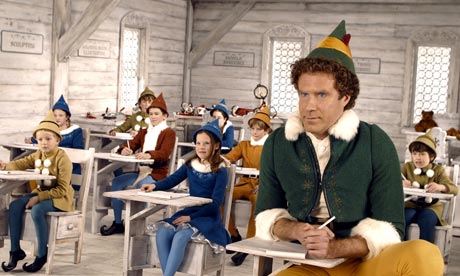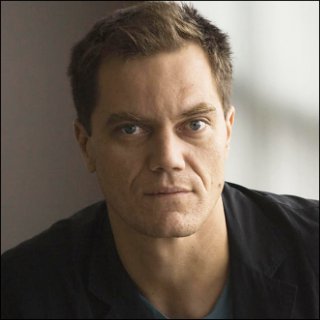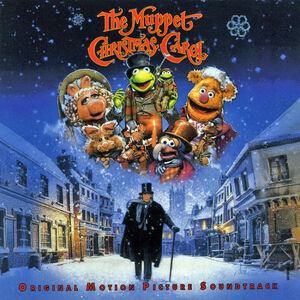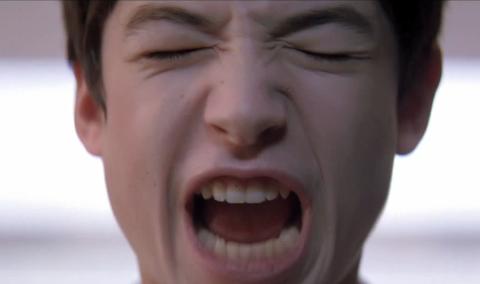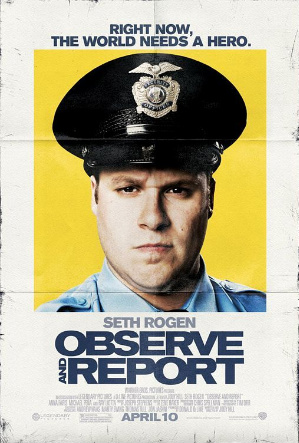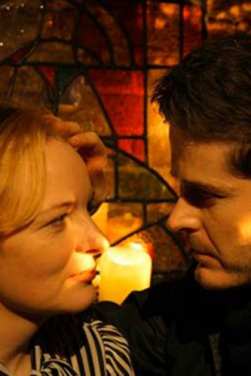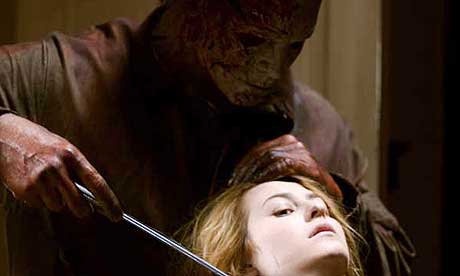We’re almost there. I know that you’ve read through a LOT of words on the films of 2009 to get here, but this is IT, the list of the 10 films that, if you saw nothing else from 2009, you should have made absolutely certain to catch. Once again, these picks are based on UK screening dates; these 10 films either received UK releases or were seen at a UK festival during 2009.
For my money this year’s Top 10 represents a great selection of cinema, it encompasses films from France, Japan, Greece, Germany and Denmark as well as the US and generically they vary from absurdist comedy to surreal drama to shocking horror. Something, then, for everyone, and a signal that, even in the age of Transformers: Revenge of the Fallen, cinema is in rude, even inspiring, health.
As with the Bottom 10, the quotes are drawn from my original review of each title
The Top 10
10: Le Premier Jour Du Reste De Ta Vie
[The First Day of the Rest of Your Life]
Dir: Rémi Bezançon
“this film feels like a peek into the lives of these vibrant and engaging people.”
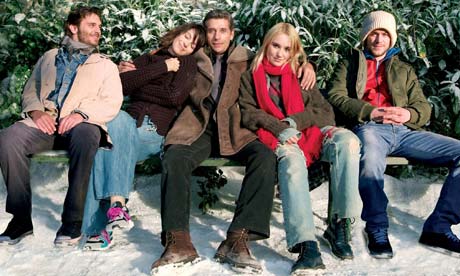
Despite the fact that it ends up covering 15 years in the life of a family, taking in a lot of life’s major turning points (from the day a child moves away from home, to marriage, to death) along the way, The First Day of the Rest of Your Life could be accused of being a rather slight film. That’s largely thanks it’s surprising lightness. Director Rémi Bezançon could, with largely the same script, have made a much darker, more depressing film, but instead, even in the darkest of times he fills the film with humour. It’s this that really brought it to life and made it feel real for me because that, at least in my experience, is what family life tends to be; black comedy.
Rather than attempt to tell the whole story of 15 years the film zooms in on five key days (with a few contextualising flashbacks thrown in), each of which focus on a different member of the family. This is a nice idea, because it gives each of the excellent cast their own moment to shine. I laughed a lot, more than in most comedies I saw this year, during The First Day of the Rest of Your Life, but it also works as a drama, the acting (especially by Jacques Gamblin, Zabou Breitman and Deborah Francois) is terrific, and really allows you to connect with these five people. By the devastating last couple of scenes I was crying a little bit.
9: 空気人形
[Air Doll]
Dir: Hirokazu Koreeda
“if 45 minutes into Air Doll you aren’t head over heels in love with Bae-Doo-na then, honestly, you and I have nothing to say to one another.”
 In recent years there have been a couple of films that have used the idea of a man obsessed with his ultra realistic sex doll. Lars and the Real Girl played it for pathos, Love Object for horror. Air Doll is a little different, because it’s first film to give the doll life. Bae Doo-na plays Nozomi, a sex doll who, as the film has it, ‘finds a soul’. When her owner leaves for the day she comes to life. She gets a job at a local video shop, where a young clerk falls for her, and who could blame him?
In recent years there have been a couple of films that have used the idea of a man obsessed with his ultra realistic sex doll. Lars and the Real Girl played it for pathos, Love Object for horror. Air Doll is a little different, because it’s first film to give the doll life. Bae Doo-na plays Nozomi, a sex doll who, as the film has it, ‘finds a soul’. When her owner leaves for the day she comes to life. She gets a job at a local video shop, where a young clerk falls for her, and who could blame him?Excellent though the whole is, Bae Doo-na’s enchanting performance as Nozomi is pretty much the whole reason that Air Doll makes this list. Her wide-eyed innocence is totally convincing, she makes you believe the character in small ways; the slightly awkward movements, her mobility restricted both by her moulding and the fact that it’s all very new to her, her delivery is also excellent, as Nozomi haltingly learns to speak. More than ever, in both her look and her wonderful light comic touch, Bae channels the spirit of Audrey Hepburn.
Air Doll could quite easily have been little more than a confection but thanks to Koreeda’s intelligent screenplay and Bae’s performance it becomes a fascinating study of a character learning how to live. It’s often very funny (never more so than when Nozomi mistakes the seams in a woman’s tights for the seams in her own legs), sweet and romantic (the relationship between Nozomi and the store clerk is genuinely moving) and sometimes rather sad. It does, however, always remain the Bae Doo-na show.
8: Das Weiße Band
[The White Ribbon]
Dir: Michael Haneke
“an atmosphere of impending doom and of utter dread that begins as an almost imperceptible background note, but grows with every passing frame to a crescendo.”

Michael Haneke’s Palme D’Or winner is a barnstorming return to form from the utterly pointless excursion of Funny Games US. The White Ribbon struck me as a film of contradictions. It’s utterly about violence, but there is almost none on screen. It begins by saying that it is going to explain the events you are about to see, but not only does it not explain, it obfuscates. The setting; a rural village in Germany in 1913, is important, because the implication is that the people responsible for the violent incidents that begin to plague the village are its children, children who are the exact right age to be among the leaders when the Nazi’s come to prominence. In the absence of its depiction The White Ribbon becomes a film about the threat of violence, and in the casual cruelty meted out we can see the seeds of incipient fascism.
At a time when more and more films are going for a handheld, in the moment, style The White Ribbon is perhaps visually unfashionable, with its beautifully composed, somewhat artificial, framing. There is a formality to the whole film that feels a little bit old fashioned and gives it an air of the work of directors who have inspired Haneke; notably Dreyer and Bergman. The visuals, as well as being astonishingly beautiful, suck us into the period and the mindset of this village.
There are several startling scenes in The White Ribbon, but few more so than when the village doctor tells his lover (Haneke regular Susanne Lothar, excellent as always) in the plainest and cruellest terms possible, that he no longer wishes to see her. This is perhaps Haneke’s great triumph with this film, he keeps the physical violence off screen, giving both it and the perhaps more devastating psychic violence of the film stronger impact. Impact is the word, despite moving at a glacial pace, despite maintaining an austere distance from both the events of the story and us the audience and despite the fact that it never really does what it tells us it is going to do, The White Ribbon is a film that will live with you, a troubling, disturbing piece of work that you can’t just shrug off.
7: Das Herz ist ein Dunkler Wald
[The Heart is a Dark Forest]
Dir: Nicolette Krebitz
“incredibly brave, emotionally shattering and monumentally shocking.”

Nina Hoss is one of the best actresses I’ve seen in the last few years, sadly what I’d seen her in had largely been unworthy of her talents, until this. Written and directed by a former model (she’s on the cover of New Order’s Get Ready album) The Heart is a Dark Forest finally sees Hoss appearing in a film (at least in one that an English audience has a chance to see) that matches the depth and intelligence of her performance.
The film starts off as a slice of life drama, with Hoss discovering that her husband (Devid Streisow) has another family across town, but from there it becomes stranger with each passing scene, culminating in a third act set at a masked ball much like that in Eyes Wide Shut. Krebitz shows real strength of vision here; the film is beautifully, artfully, designed and quite beguilingly strange. Krebitz’ images, along with an excellent score by Fetisch and The Whitest Boy Alive, which combines classical instrumentation with dance beats create a strange, doom laden atmosphere in which you never quite know where the film is going.
However, the real gut punch is the ending. Krebitz sent her script out with a fake ending, because she feared that, while it’s not explicit, the film’s actual ending would be so shocking that she wouldn’t get financed if it were in the script. I can’t imagine what she wrote to send out to financiers, because no other ending would make sense for this film, and no other ending would have the shattering impact of the one we see, or rather don’t see. This is a film that announces a major new talent, a brave and interesting filmmaker with a real voice. Seek it out.
6: Dear Lemon Lima
Dir: Suzi Yoonessi
“a wonderful find, a sweet and very smart film that will make you laugh and very possibly cry.”

Dear Lemon Lima won’t win any prizes for originality, it’s easy to see echoes of films like Revenge of the Nerds, Napoleon Dynamite and Juno among others, it is, however more than just another in a long line of quirky high school movies.
That’s thanks in large part to debuting writer/director Suzi Yoonessi, who based the film on her own teenage years, and expanded this feature from a short film. The fact that this is clearly a personal project for Yoonessi really comes through in her screenplay, which is very smart and funny, but manages to be so in a way that sounds organic. While Juno featured teens who talked like adults, adults who talked like teens and, in essence, a cast that talked like Diablo Cody, Dear Lemon Lima’s teenagers sound like teenagers, and more than that they all have their own voices. This is never more true than when we hear Vanessa (the wonderful Savannah Wiltfong) narrating the story through her diary entries, which seem so credible that I could believe either that Wiltfong was asked to write them herself or that Yoonessi simply incorporated, unedited, her own diary entries. The look of the film isn’t its biggest draw, but Yoonessi draws a nice contrast between the pastel colours of Vanessa’s imagination and the rather drab reality of her life in Alaska.
While the fact that the screenplay is consistently true and funny is certainly a major boost to what is a rather formulaic story (Girl breaks up with her first love, is a bit of a misfit, but finds another group to belong to through her school’s Snowstorm Survivor competition) what really makes Dear Lemon Lima work is its talented young cast. Yoonessi has put together an excellent group here, led by smart performances by Wiltfong, who carries the film with an assured, funny and completely believable performance and Shayne Topp, who is hilariously slimy and egomaniacal as Philip.
This is an assured debut for Suzi Yoonessi, one that mixes comedy and drama beautifully and marks her out as both a fine writer and a strong actors director. I was utterly charmed by it, and I hope some distributor picks it up for UK release so that you can be too.
5: Antichrist
Dir: Lars Von Trier
“Antichrist is an extraordinary film; I have no idea if I liked it.”

The most controversial film of the year (largely because the mainstream media utterly failed to notice a film I’ll get to soon) was also one of its best, and certainly one of its most interesting. People denounced it without seeing it, people questioned whether its passing through the BBFC uncut rendered censorship pointless, the BBC even devoted their debate programme The Moral Maze to it, all, largely, because of one (admittedly wince inducing) shot. The thing is that Antichrist is so much more than that one shot.
The violence of Antichirst actually comes rather late in the day, after about eighty minutes of scenes showing us the absolute emotional devastation of a woman (Charlotte Gainsbourg, who won the Best Actress prize at Cannes) who has recently lost her child in a tragic accident. These scenes are perhaps more difficult than the violent ones, because Gainsbourg is so brilliant that you go with her to the depths of her despair. It’s the most vivid, most accurate and most disturbing depiction of depression that I’ve ever seen. Lars Von Trier has made a film that is literally painful to watch; a searing horror film that gets to levels of disturbance that few others approach.
To say that I liked Antichrist probably isn’t true, but I was incredibly impressed by it. It is, without question, the most visually ravishing film of the year, perhaps of the decade. Anthony Dod Mantle’s crisp, gorgeous, photography brings us right into the film, making its most hideous moments even more impactful (and even more disturbing, because even as you are repulsed by what’s happening you are awed by the beauty of the cinematography). The opening five minute sequence, shot entirely in slow motion, high contrast, black and white is so beautiful it could make a grown man weep (even though it does include a hardcore insert shot that makes me want to slap Lars Von Trier, and tell him to grow up).
Many of Antichrist’s detractors tried to dismiss it as mere torture porn. They were wrong, the film is thick with meaning, so dense and layered that many viewings and hours of debate can easily be devoted to figuring out what Von Trier is saying. This is provocative cinema at its best, as with IRREVERSIBLE, the extremes to which it goes make Antichrist hard to recommend, but equally they make it impossible to ignore.
4: Up
Dir: Pete Docter
“What I really want from a movie is to be affected, and in that respect Up delivers over and over.”
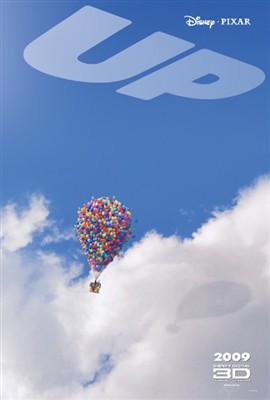 Up’s opening 15 or so minutes, the lead in to and then the montage showing us the fifty year marriage of Carl and Ellie Muntz is pure cinematic perfection. That entire montage, roughly ten minutes, is played without dialogue and yet through it we understand and share every bit of Carl and Ellie’s life together. It goes from being sweet and amusing to devastatingly sad with such assured brilliance, and is perhaps the single most moving sequence I’ve ever seen at a cinema.
Up’s opening 15 or so minutes, the lead in to and then the montage showing us the fifty year marriage of Carl and Ellie Muntz is pure cinematic perfection. That entire montage, roughly ten minutes, is played without dialogue and yet through it we understand and share every bit of Carl and Ellie’s life together. It goes from being sweet and amusing to devastatingly sad with such assured brilliance, and is perhaps the single most moving sequence I’ve ever seen at a cinema.The rest of Pixar’s latest doesn’t quite come up to that level of magnificence, but it is a rollickingly good entertainment nevertheless. The elderly Carl (Ed Asner) is a beautifully written character, his curmudgeonly façade being slowly and credibly peeled back in his quest to take his and Ellie’s house to Paradise Falls, where they had always meant to live and by his relationship with Wilderness Explorer Russell (a priceless performance from 9 year old Jordan Nagai). These unlikeliest of movie buddies make for a fantastic comic pairing, largely because Pete Docter and co-writer Bob Richardson never forget who their characters are, they don’t make Carl anything other than an old man, and Russell is always an excitable nine year old.
Up is filled with wonderful things from the characters, to the performances (Richardson’s hilarious turn as a talking dog named Dug is a highlight) to the breathtaking visuals (which will look even better in 2D, because then the colours will be as bright as they are supposed to be; the sky white rather than grey. However, it’s the emotion of the film that really makes it as powerful and as brilliant as it is.
That opening backstory lays so strong a foundation that it resonates throughout the film, Ellie, although she is dead, is in some ways the most important character. It is her spirit that makes the film’s emotion resonant, rather than cheap. I don’t often cry at movies (three times in the past decade), but I wept like a little girl during Up, I cried three times and still, having not seen it for months, I’m a little emotional as I write this. That’s a special movie.
3: Cloudy With a Chance of Meatballs
Dir: Phil Lord / Chris Miller
“slightly twisted humour permeates every frame, with side jokes all over the place and a beautifully developed sense of the absurd.”

Titles matter. Last year I saw one of my top 10 films; Russian high school movie Everybody Dies But Me purely because of the brilliance of its title, and this year I very nearly missed Cloudy With a Chance of Meatballs because it was called Cloudy With a Chance of Meatballs, however, on hearing Mark Kermode call it ‘David Lynch for kids’ I decided I should check it out. What I found was the funniest, most anarchic and most flat out enjoyable comedy I’ve seen in a long time.
I loved this movie ten seconds in, when the credit “A Film by A Lot of People” came up (my Brother tells me he loved it even before this, when a CG banana crushed the Columbia logo). I knew I was in the hands of people with both a love of movies and a proper sense of satire, and from that moment on until the credits rolled I don’t believe a minute went by without me laughing out loud. The influences are many, and easy to see, as well as Lynch and Terry Gilliam there are shades of both Looney Tunes and Monty Python here. The amazing thing is that Cloudy doesn’t disgrace any of these illustrious names.
The very silly story of Flint Lockwood (Bill Hader), who invents a machine that causes it to rain food on his tiny island town is already very pyhtonesque, but directors Phil Lord and Chris Miller simply pack the film with silliness, making it so gleefully packed to the gills with absurdity that you really will have to see the film twice to see all the jokes. Even the running gags just keep on scoring. Flint’s talking monkey Steve (voiced by Neil Patrick Harris), for example, is the comedy gift that just keeps on giving, despite his limited vocabulary. What’s great, though, is that the film doesn’t just lean on its wackiness. It knows when to pull back a little, and the story actually has some strong emotional content. The romance between Flint and weather girl Sam Sparks (a perfectly cast Anna Faris) is actually nicely developed, and played with some sensitivity, as is the fractious relationship between Flint and his father (James Caan).
The film looks great, with the closing set piece, in which Flint and Sam have to try and shut his machine down, being a particular highlight, not least for the wonderfully bonkers sequence in which they are attacked by anthropomorphic roasted chickens. Cloudy With a Chance of Meatballs is an indulgent treat, and a film that signals that somewhere in Hollywood there are still original, crazy, talented people making films.
2: Kynodontas
[Dogtooth]
Dir: Yorgos Lanthimos
“a strange and haunting piece of work, one that you’ll be going over in your head long after its abrupt finish.”

I’ve seen about 7000 films. Think about that for a second, and then wonder how often I see something that strikes me as truly new and different. Dogtooth is one of that increasingly rare breed of films.
The story of a family of five, the parents (Chris Stergioglou and Michelle Valley) have raised their three children (Hristos Passalis, Aggeliki Papoulia and Mary Tsoni), all now in their late teens or twenties, in a completely insular world, they have never left the family garden. Only the Father goes out, to work. The only outsider is Christina (Anna Kalaitzidou), who the Father has hired to tech his son about sex, practically. There isn’t much of an overarching plot here, but the film is compelling in its utter strangeness, even more so because it never explains itself, it never tells us why the Father and Mother raise their children this way.
Dogtooth is a disturbing film, primarily in the way the children relate to one another. Their games are bizarre, and everything is a competition. The elder daughter (Papoulia) appears to be the family doctor, and at one point she and her sister (Tsoni, whose band Mary and the Boy provide some of the film’s music) huff an anaesthetic, saying that the first to wake up will be the winner. There’s a chilly distance to the whole film, placing you at one remove from the characters, thanks largely to the formality of Lanthimos’ compositions. Usualy this distance and artificiality would be frustrating, here it just adds to disturbing sense of being completely in the dark as to what is going on here, and what can possibly happen next.
Some people will hate this film. It is a bizarre, graphic, disturbing thing that refuses to explain anything and ends without any real resolution. I thought it was perfect in this regard, no explanation could possibly be enough and the fact that no effort is made to put a bow on the ending just means that the film continues to play, troublingly, on your mind. This is intense, intelligent cinema and well worth seeing when it opens in the UK this spring.
1: Martyrs
Dir: Pascal Laugier
“it’s out to disturb, to disquiet, and it achieves that aim from first frame to last.”
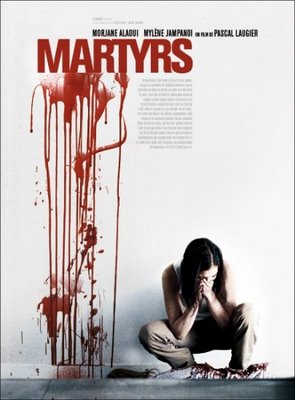 Here’s how Martyrs affected me. After I first saw the film there was a Q and A with director Pascal Laugier and leads Morjana Alaoui and Mylene Jampanoi, which lasted about half an hour. When I stood up after that session I was still weak at the knees. I told Mylene Jampanoi that I wasn’t sure I had exactly liked Martyrs, but that I had thought it was brilliant, and knew that I needed to see it again.
Here’s how Martyrs affected me. After I first saw the film there was a Q and A with director Pascal Laugier and leads Morjana Alaoui and Mylene Jampanoi, which lasted about half an hour. When I stood up after that session I was still weak at the knees. I told Mylene Jampanoi that I wasn’t sure I had exactly liked Martyrs, but that I had thought it was brilliant, and knew that I needed to see it again.Martyrs is, by far, the best new film I saw in 2009. It leaves everything else in the dust. It may not be the best shot (that’s Antichrist), it may not have the best single sequence of the year (that’s at the start of Up) but its cumulative effect is staggering. This is a horror film of truly special intensity, and it amazes me that in the year the mainstream media went bonkers about Antichrist nobody noticed Pascal Laugier’s far more violent, far more punishing film. This is, at the end of the day, an assaultive film; it grabs you by the throat just minutes in and then shakes you, refusing to let go, for the next 90 minutes. Laugier says it is a film not about torture but about pain, and he’s absolutely right. Pain is the defining element of this film, it is about the psychic and physical pain of torture, it is about the pain of loss, it is about the pain inflicted in vengeance. It is, at times, also painful to watch, and that is exactly as it should be.
Taking us through the film are two searing, brilliant, performances from Alaoui and Jampanoi, whose utter conviction sells what could easily have been a risible story (especially in the film’s mind-blowingly brutal second half). Alaoui is perhaps especially good, making her relationship with Jampanoi’s character something that we can invest in in short order, and then using that investment to devastating effect in the last passage of the film.
Laugier stages the film’s extensive violence brilliantly, every moment feels completely, hideously, real and even when, at the end, things become a touch more outlandish, we are able to go along because of both the quality of the effects and the believability of the film’s violent content to that point. The effects, from the simple task of getting the blood to look real, to gunshots, to a smashed head to, well, an image you won’t soon forget, are exceptional.
What really makes Martyrs special though is that its impact isn’t gratuitous. There may be a 20 minute sequence in this film consisting largely of a series of beatings meted out to Morjana Alaoui’s character, but that sequence isn’t there for you to enjoy at any level (and if you do, seek help), it’s there to serve the story, to help make an actual point. It’s so rare to see an extreme horror film that is really about anything more than violence, and this one certainly is. Debate will rage after you see it about the nature of the film and especially the nature and meaning of its ending, but the sheer impact of Martyrs can’t be denied, whatever else you think of it. I've now seen it four times, and each time I come away more impressed. I believe it to be a masterpiece, and the greatest horror film of the last ten years.


